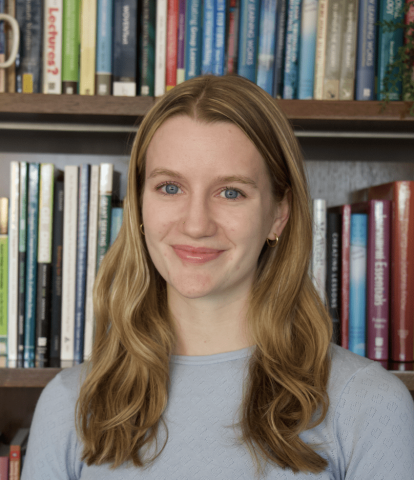
At first glance, Maeve Janecka’s academic career is already impressive. As a pre-med student, member of the Champion Research Group, former Chief Justice and current Cabinet Member of the Undergraduate Judiciary Cabinet (UJC), and recent winner of a highly coveted Marshall Scholarship,“ Maeve embodies Georgia Tech’s mission of developing leaders who advance technology and improve the human condition,” says Ronald Mazique, the director of the Office of Student Integrity, a collaborator with the UJC.
But Janecka is not driven by accolades, awards, or honors. Both her research and extracurricular work, though seemingly unrelated, are motivated by a singular goal — to be a voice for the vulnerable.
“Freshman me would be very surprised to see where I have ended up,” Janecka said while describing her journey from upstate New York to Georgia Tech and her decision to leave Chemical Engineering for pre-med. “Research in women’s health has lagged, which leaves so many without adequate care. That’s why I hope to help develop better diagnostics and treatments in my graduate studies.”
Janecka said she knew she had found her calling in helping others through her research, specifically supporting women’s and reproductive health, which was motivated by her endometriosis diagnosis as a teenager. What she didn’t expect was that she would find other ways to support her calling in some unexpected places.
“Maybe I watched too much Law & Order during the pandemic,” Janecka said of her decision to join the UJC in her sophomore year. “A friend said it would be sad and difficult, but as I got involved, it became clear it was a group of students who were there to support their peers.”
The UJC partners with the Office of Student Integrity (OSI), a unit in the cabinet area of Student Engagement and Well-Being. Janecka said she realized that both OSI and the UJC are organizational bodies whose reputation is that of being solely punitive but who are, in fact, advocates for students when they are at their most vulnerable.
“Ultimately,” she said, “I learned that the UJC and OSI are in place so that if you make one bad decision, it doesn’t have to define you.”
Her work with the UJC, where the discussion frequently turns to helping a student who has had a lapse in judgment, offered a parallel path of advocacy and support for someone in need. She said she sees her research and her extracurricular work as two sides of the same coin — both are ways in which she serves her calling of helping others.
After her graduation in May 2024, her recently awarded Marshall Scholarship will allow Janecka to continue her work overseas by pursuing a graduate degree at the University of Oxford, where she will join the Endometriosis CaRe Centre in fall 2024.
“It still doesn’t quite feel real,” she said of winning the scholarship. “I learned that I had been awarded a Marshall Scholarship on the same day I interviewed.”
The Marshall Scholarship is awarded to 50 high-achieving U.S. undergraduates each year and allows them to undertake their graduate work in any field at a U.K. institution.
Janecka is eager to join the work at the CaRe Centre, noting that “I can come in with a proposal and dive right in from the start. The leading labs in the U.K. take a different approach to research than we do in the U.S., and I’m grateful for the opportunity to take what I’ve learned at Georgia Tech and apply it to new experiences in this new environment.”